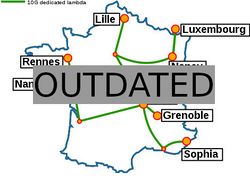Grid5000:Home
|
Grid'5000 is a large-scale and versatile testbed for experiment-driven research in all areas of computer science, with a focus on parallel and distributed computing including Cloud, HPC and Big Data. Key features:
Older documents:
|
Random pick of publications
Five random publications that benefited from Grid'5000 (at least 2937 overall):
- Guillaume Schreiner, Pierre Neyron. SLICES-FR : l’infrastructure de recherche nationale pour l’expérimentation Cloud et Réseaux du futur. JRES 2024 - Journées réseaux de l'enseignement et de la recherche, Renater, Dec 2024, Rennes, France. pp.1-15. hal-04893845 view on HAL pdf
- Barbara Gendron, Gaël Guibon. Context-Aware Siamese Networks for Efficient Emotion Recognition in Conversation. 2024. hal-04532408 view on HAL pdf
- Jan Aalmoes. Intelligence artificielle pour des services moraux : Concilier équité et confidentialité. Intelligence artificielle cs.AI. INSA de Lyon, 2024. Français. NNT : 2024ISAL0126. tel-05014177 view on HAL pdf
- Dorian Goepp, Fernando Ayats Llamas, Olivier Richard, Quentin Guilloteau. ACM REP24 Tutorial: Reproducible distributed environments with NixOS Compose. 2024, pp.1-3. hal-04613983 view on HAL pdf
- Chih-Kai Huang. Scalability of public geo-distributed fog computing federations. Other cs.OH. Université de Rennes, 2024. English. NNT : 2024URENS055. tel-04910860v2 view on HAL pdf
Latest news
Failed to load RSS feed from https://www.grid5000.fr/mediawiki/index.php?title=News&action=feed&feed=atom: Error parsing XML for RSS
Grid'5000 sites
Current funding
As from June 2008, Inria is the main contributor to Grid'5000 funding.
INRIA |
CNRS |
UniversitiesUniversité Grenoble Alpes, Grenoble INP |
Regional councilsAquitaine |


